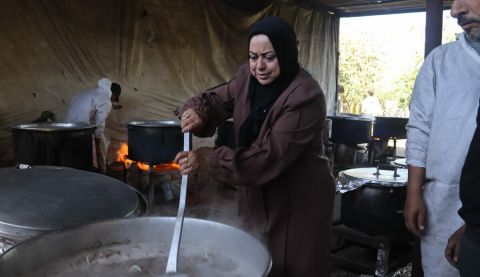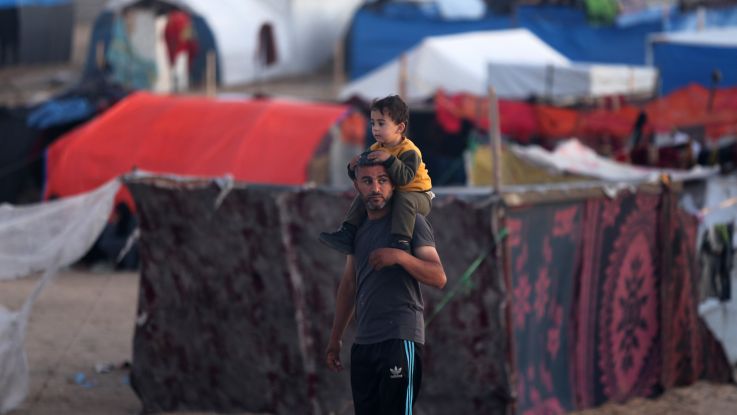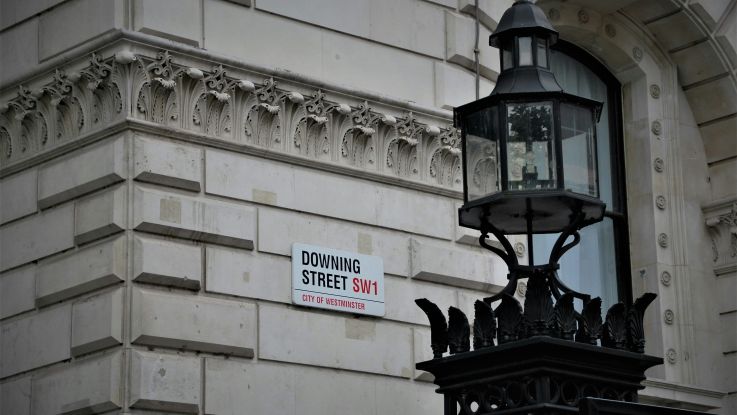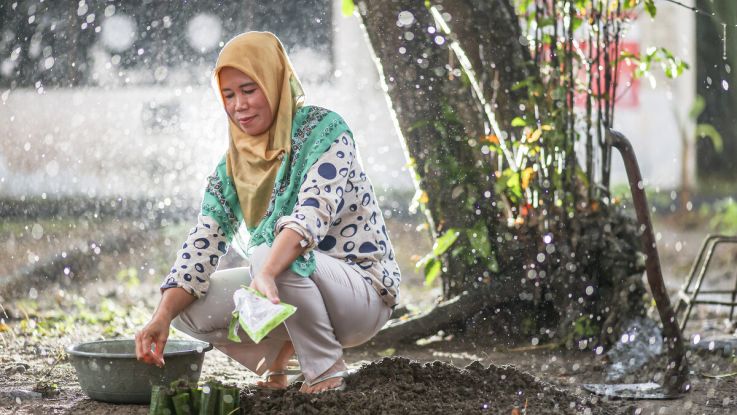The next government must prioritise women in Gaza
27 June 2024
As we have explained in the ActionAid UK manifesto, there is much that the next UK Government – whoever that might be – needs to do to be a genuine international development and humanitarian partner. This includes implementing the commitments to women and girls that were made in the UK’s women, peace and security National Action Plan.

Members of an ActionAid partner organisation, the Women and Child Care Association (WEFAQ), distributing food in Gaza. Photo: ActionAid
We are currently nine months into the conflict and humanitarian catastrophe that has taken over Gaza and Israel.
The crisis, and the UK’s response to it, have proved to be important issues for the electorate. The majority of the British public think there should be an immediate ceasefire in Gaza, and support the ending of arms sales to Israel during the conflict1 - so future MPs and the next government face questions and demands for action in the UK's response.
But, political pressure aside, putting women and girls at the heart of their Gaza response is both the right thing to do, and the pragmatic thing to do.
At ActionAid we know that women and girls bear the brunt of humanitarian crises. This is no exception in Gaza, which is one of the most dangerous places in the world to be a woman.
But women's groups are also the best solution to the crisis. It is women leaders and organisations who are leading the humanitarian response in Gaza, despite the fact that these organisations are consistently overlooked and underfunded.
Women and girls in Gaza face human rights violations
Women and girls in Gaza are facing greater food insecurity2 , as they are more likely than men to eat least and last. Pregnant and lactating women face the highest health and malnutrition risks2 . And sexual violence increases during conflict: there are numerous reports of sexual violence and harassment against Palestinian and Israeli women.
The UN has expressed grave concern over ongoing human rights violations faced by women and girls in Gaza, including sexual violence being used as a weapon of war, which is a war crime. These incidents are extremely concerning and must be investigated.
Palestinian women are leading the crisis response
They face a disproportionate risk during this crisis, but it is Palestinian women, and the organisations they lead, who are are at the heart of the humanitarian response2 . They're delivering life-saving support to people in desperate need.
Across Gaza, these grassroots women-led organisations are contributing to urgent humanitarian coordination and response efforts in important ways, including providing legal aid, psychological support, shelter and services to prevent and protect women from gender-based violence.
Thanks to their long-standing and trusted relationships in their communities, these women-led groups are in the best position to understand the root causes of the challenges they face, and the needs and realities of women and girls. They're providing wide outreach to communities, enabling them to reach the groups most left-behind, including women with disabilities, and advocate for their rights.
But, nine months into the escalation of the Gaza conflict, 56% of women’s organisations in Gaza reported a decrease in funding since October 2023.2
The next government must recognise the contribution of women-led organisations
That's why we're calling for the next government to properly recognise the contribution of these organisations - and ensure that they receive the funding they need.
In our manifesto, we're asking for the next government to champion women’s leadership in the overlapping peacebuilding, humanitarian and development contexts.
These commitments are not new: the UK has already made many commitments on the international stage recognising the unique gendered dynamics of violence - most notably the Women Peace and Security National Action Plan (NAP) 2023-2027 and the International Women and Girls Strategy.
So we're calling on the next government to uphold and reinforce international law, civilian protection, women's participation in peace processes, and atrocity and conflict prevention, as central pillars of UK foreign policy.
Specifically, we're asking that next government to:
- Promote and actively support the participation and leadership of women in peacebuilding efforts. This involves facilitating the inclusion of Palestinian women in decision-making processes regarding reconstruction, crisis response, and any potential political process.
- Ensure humanitarian assistance is immediate, consistent, sufficient and tailored to women and girls, particularly through women's rights organisations. These organisations often have a deep understanding of the unique needs and experiences faced by women and girls in crisis situations. This can be done via open dialogue with women-led groups, to get advice on how to best to remove barriers to women’s meaningful engagement in humanitarian action, and better understand the gendered gaps which may have diminished programming effectiveness for women and girls. For effective humanitarian response, the UK should also reinstate funding to UNWRA.
- Strengthen accountability towards international gender commitments in the coordination and implementation of the humanitarian response, and ensure an age, gender and disability-sensitive UK response, including being tailored to women's and girls' specific needs and risks. This should be done by undertaking comprehensive gender conflict analysis at the different stages of emergency response.
- Advocate for an immediate and permanent ceasefire to halt all hostilities, including an end to the violence and the release of all hostages.
- Publicly reaffirm the UK's commitment to upholding international law and respecting the independence and mandate of international courts and tribunals. This including holding accountable those responsible for violations of international humanitarian law and ensuring that perpetrators face consequences for their actions.
- Cease the licensing and export of arms, components, and military equipment to the Israel Government, and end all UK military support for Israel's offensive operations, so long as there is a risk that these resources may be used to violate international law.
Please join us today by signing our open letter to the next UK Government, asking them champion women’s leadership and support the life-saving work of women’s rights organisations, both in Gaza and across the world.



